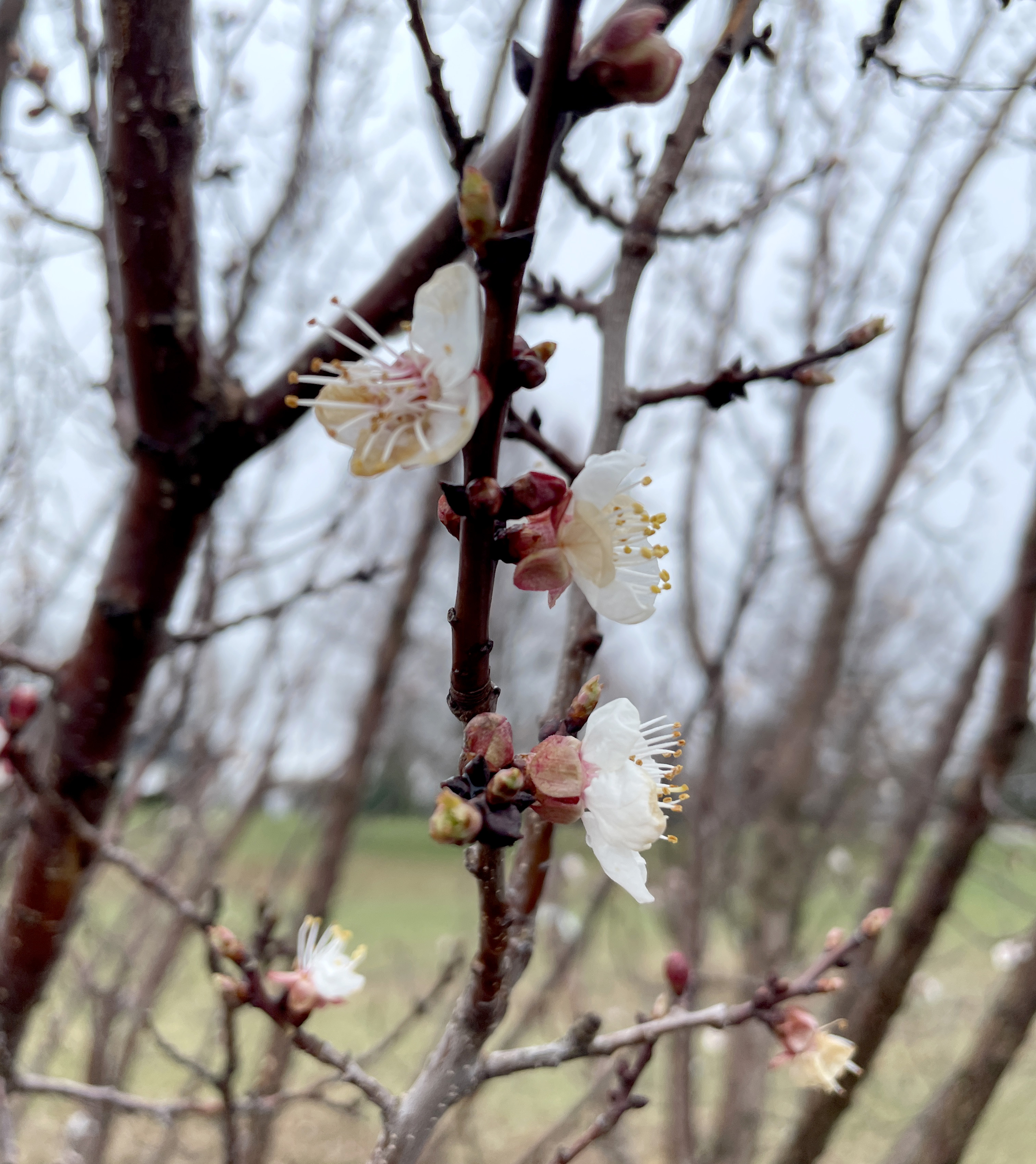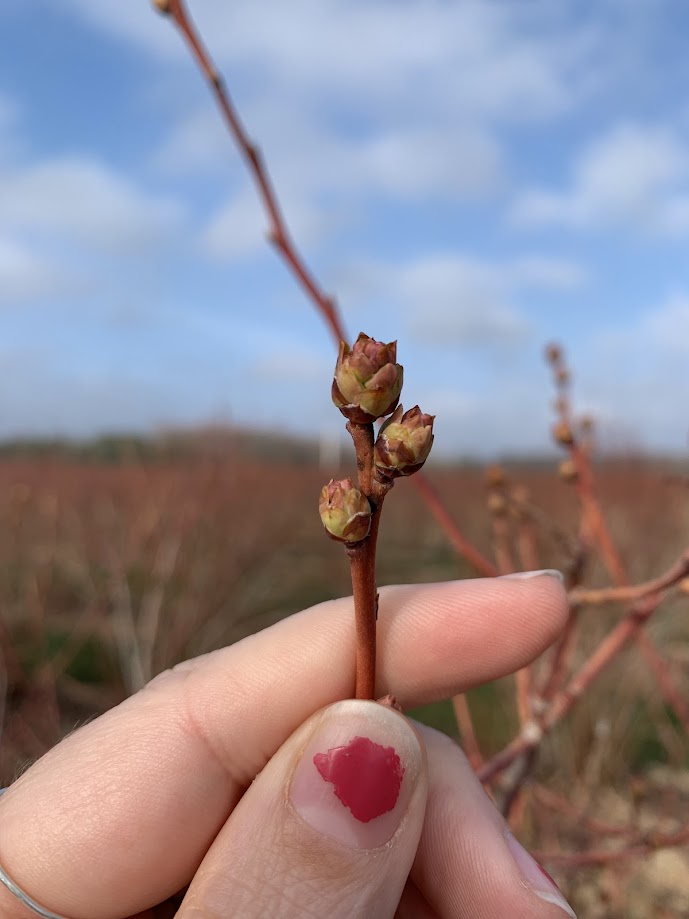Southwest Michigan fruit update – April 2, 2024
Current cool weather has slowed fruit crop development.

March weather
March temperatures were quite variable. The region saw high temperatures from the mid-30s up to above 70 degrees Fahrenheit. This, combined with the record warm January and February, pushed fruit crops into waking up early. Cooler temperatures in the third week of March slowed down development, but potentially caused some localized minor damage to some crop types. Last week saw a rebound in temperatures with high temperatures in the 50s to near 60 most days. Friday morning, March 29, saw the coldest temperatures with most stations in southwest Michigan recording temperatures in the low to mid-20s. Rain systems passed through the region over the course of three days beginning March 30. Total rain amounts for the region were 1 to 1.5 inches.
With the warmer than average March, we are ahead of average for growing degree days (GDD) this year. We are one to two weeks ahead of the 20-year average.
|
Southwest Michigan GDD summary from March 1 – April 1, 2024 |
|||
|---|---|---|---|
|
Station |
GDD 42 F |
GDD 45 F |
GDD 50 F |
|
Benton Harbor (SWMREC) |
162 |
120 |
69 |
|
Lawton (Lawton) |
157 |
116 |
65 |
|
Fennville (TNRC) |
133 |
97 |
54 |
|
Average for the SW region |
140 |
101 |
56 |
A cold front will bring another inch of rain today, April 2. Temperatures tomorrow are expected to stay below 40 F before gradually warming as we approach the weekend. By Monday, April 8, we may see close to 60 degrees. Scattered showers are possible tomorrow and Thursday, then again on Monday. Monday is the date for the solar eclipse. Cloud cover should make direct visibility of the eclipse unlikely but be prepared for the slight darkening that will still occur from the event on Monday afternoon. The maximum effect will be shortly after 3 p.m.
Tree fruit
The return of cool conditions has slowed tree fruit development over the past week. Bloom is starting to open in some plum varieties. In general, fruit buds showing bloom are susceptible to cold damage with temperatures in the 20s F and below.
Apricots are at petal fall in central Berrien County. Brown rot infections are favored by wet conditions and temperatures over 50 F during bloom.
_Bill Shane.jpg)
Peach and nectarine are at full pink in Berrien County and first pink in Allegan County. A few surviving fruit buds are being seen in Berrien County, mainly basal buds and on rootsuckers of Bailey rootstock. Oriental fruit moth management is necessary in late April to prevent branch end damage that distorts tree structure.
In cherries, sweets are at late green tip and tarts are at green tip in central Berrien County. Copper sprays can be safely applied to cherries, but rates should be reduced because of exposed green tissue. Copper applications may help to reduce bacterial canker in cherries.
In plums, Shiro Japanese plum fruit buds are at first white and Stanley European plums are at tip green to early tight cluster. Spring Satin pluot are at first bloom. Prune out black knot and dispose of the knots by burning or removing from the orchard. Sanitation is an important step in managing this disease.
Apple early variety Zestar is at late tight cluster, and McIntosh and Gala are at first tight cluster. Red Delicious, Goldens and Jonagold are at half-inch green in Berrien County. More reports of some damage to king bloom in apple are coming in, but overall crop prospects are still excellent.
Apple scab ascospores are being caught in area traps. Green tissue here was exposed to a scab infection event for most of the southwest region on March 9. Symptoms can take several weeks to show up under current cool conditions. Scab sprays will be needed to protect against future rains as green tissue continues to expand. Protectants are preferred over systemic fungicides at this time of year for scab control to limit chances for resistance and because of limited tissue for systemic product absorption.
Pear (Bartlett and Harrow Sweet) buds are at tight cluster in Berrien County. Crop potential is still very good. Pear psylla adults are flying on warm sunny days. Continued scab sprays are needed to protect green tissue against infection.
Small fruit
Grapes show little movement. Growers are still deciding how much damage they have from the January cold event and deciding pruning practices accordingly. Berrien County and eastern Van Buren County saw the coldest temperatures. Vinifera wine grapes show significant damage in these areas. Some hybrids have been affected in some of these locations as well. Juice grapes were largely unaffected. Allegan County has less damage and a decent vinifera crop is still expected. No bud swell is being reported, but sap flow has begun in many varieties. For growers looking to delay budbreak, some research indicates that oils such as Amigo oil sprayed on dormant buds can delay budbreak for a few days, but delayed pruning seems to have more consistent results.
Blueberry are at bud swell in Berrien County up through the very southern parts of Allegan County with some early season varieties entering early stages of bud break near Paw Paw, Michigan. Growers still have time to apply copper, Sulforix or lime sulfur products to suppress early season diseases.

Strawberry overwintering mulches should be removed and raked between the rows. Some growers are putting out floating row covers. Growers are looking at early season herbicides to control overwintering weeds. When selecting an herbicide, check the preharvest interval.
In brambles, many growers are dormant pruning. In summer bearing raspberries, last year’s primocanes should be headed (cut back) to the desired height and any remaining floricanes from last year should be removed. Fall bearing raspberries should be cut or mowed to the ground. Lime sulfur treatments for anthracnose can still be applied.
Upcoming meetings
Our regular southwest Michigan Monday fruit integrated pest management updates will once again be a hybrid format. The meetings will be held in-person at the Southwest Michigan Research and Extension Center, 1791 Hillandale Rd, Benton Harbor, MI 49022, with virtual attending available online. Our first meeting is Monday, April 15, at 5:30 p.m. See next week's southwest Michigan fruit update for signing up for the Zoom meeting. No advanced signup is needed for attending in-person. These meetings are free and one pesticide applicator credit is available for each meeting.
April 9 – Blueberry Replant and Soil pH Workshop
April 10 - An all-new event for 2024, the Spray Drone Spring Fly-in is an all-day workshop for current or future spray drone pilots. This event will start with a morning of education on several aspects of applications for agriculture and related industries. The afternoon will be an opportunity to see spray drone swath testing in progress and possibly test your own.
Additional information and surveys
Michigan State University is running a pollinator survey this spring and summer to understand how people interact with pollinators in natural, urban and managed landscapes. The survey is anonymous and takes only 10-15 minutes to complete.
This work is supported by the Crop Protection and Pest Management Program [grant no 2021-70006-35450] from the USDA National Institute of Food and Agriculture. Any opinions, findings, conclusions, or recommendations expressed in this publication are those of the author(s) and do not necessarily reflect the view of the U.S. Department of Agriculture.



 Print
Print Email
Email